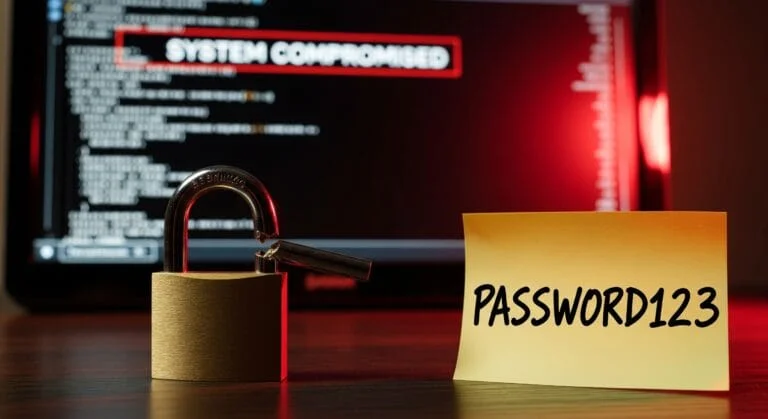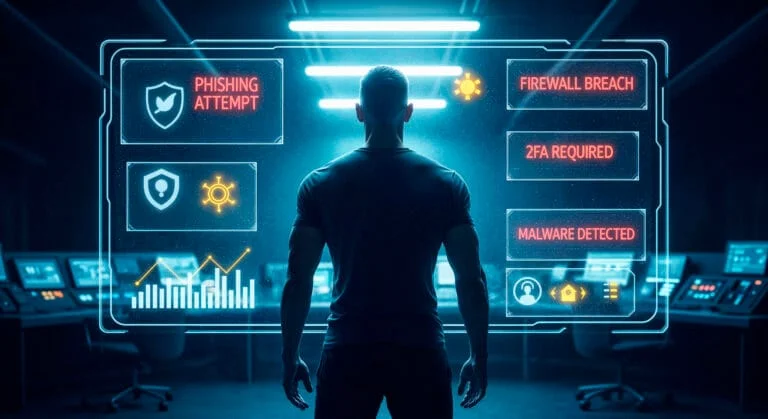Table of content
A single compromised password can spell disaster for even the most established businesses. With ransomware attacks in the UK reaching epidemic proportions—19,000 attacks on UK businesses annually, according to the National Cyber Security Centre (NCSC)—the shocking collapse of KNP Logistics serves as a stark reminder of how weak password vulnerability can lead to catastrophic consequences.
The transport company’s 158-year operational history was erased in days, putting 700 employees out of work and highlighting the urgent need for robust cybersecurity measures across all industries. The National Crime Agency reports handling 35–40 new ransomware cases per week, nearly double the rate from 2023, making 2025 potentially “the worst year on record for ransomware attacks in the UK.”
The Fall of a Transport Giant
KNP Logistics, operating primarily under the Knights of Old brand, was no small operation. By 2023, the UK transport company was running an impressive fleet of 500 lorries, providing essential logistics services across the region. This 158-year-old logistics giant had built its reputation on reliability and service excellence, operating under the proud Knights of Old brand that emphasised “Service with Honour.”
However, beneath the surface of this seemingly robust operation lay a critical vulnerability that would ultimately seal the company’s fate. Despite having what the company believed were industry-standard IT protections and comprehensive cyber-attack insurance, KNP Logistics fell victim to one of the most devastating ransomware attacks in recent UK business history—demonstrating how modern cyber attacks can erase decades of built reputation and community investment in a matter of days.

The KNP Logistics Cyber Attack: A Wake-Up Call

The Impossible Choice: Pay or Perish
When faced with the aftermath of the cyber attack, KNP Logistics found itself in an impossible position. Specialist ransomware negotiation firms estimated that the ransom demand could reach as much as £5 million – a sum that the UK transport company simply could not afford.
This situation reflects the broader trend where criminals are demanding increasingly large sums from their victims. Industry research suggests that the typical UK ransom demand is approximately £4 million, and shockingly, about one-third of targeted companies simply choose to pay up rather than fight back.
Unable to pay the ransom and with all critical data encrypted, KNP Logistics faced an inevitable collapse. The Knights of Old brand, which had served customers with honour for generations, was forced to cease operations entirely. The human cost was devastating – 700 employees lost their jobs overnight, representing not just individual tragedies but a significant economic impact on the local community.

The company’s headquarters in Northamptonshire meant that the attack had significant local economic implications. As a major employer in the region, the company’s collapse created a ripple effect throughout the local economy, affecting local suppliers, service providers, and the entire community.
The Growing Ransomware Epidemic

- 19,000 ransomware attacks on UK businesses annually
- 35-40 new cases per week handled by the National Crime Agency (nearly double from 2023)
- £4 million average ransom demand in the UK
- One-third of companies choose to pay ransoms rather than fight back
The Vulnerability That Changed Everything
The weak password vulnerability that brought down KNP Logistics represents a fundamental failure in basic cybersecurity hygiene. Despite the company’s belief that its IT systems complied with industry standards, the simple act of password guessing was enough to compromise the entire network.
This type of weak password vulnerability is alarmingly common across UK businesses. Many organisations still rely on easily guessable passwords, fail to implement multi-factor authentication, or don’t regularly update their security protocols. The KNP Logistics case demonstrates how these seemingly minor oversights can have catastrophic consequences.
Cybersecurity experts consistently identify weak password vulnerability as one of the most preventable yet persistent security risks facing businesses today. Simple measures such as enforcing complex password requirements, implementing regular password changes, and requiring multi-factor authentication could have potentially prevented this disaster.

The Human Element in Cybersecurity

One of the most poignant aspects of the KNP Logistics cyber attack is the human dimension. Paul Abbott, the company director, revealed that he hasn’t told the employee whose compromised password likely led to the company’s destruction. “Would you want to know if it was you?” he asks, highlighting the psychological burden that cybersecurity failures can place on individuals.
This situation underscores the importance of creating a cybersecurity culture that focuses on education and prevention rather than blame. The employee whose weak password vulnerability was exploited was likely unaware of the potential consequences of their actions. This emphasises the need for comprehensive cybersecurity training programmes that help all staff understand their role in protecting organisational data.
Lessons from Law Enforcement
The National Crime Agency (NCA) has been tracking the escalation of ransomware attacks and provides crucial insights into the evolving threat landscape. Suzanne Grimmer, who heads an NCA cybercrime unit, reports that incidents have almost doubled to approximately 35-40 per week since she took over the role two years ago.
“If it continues, I predict it’s going to be the worst year on record for ransomware attacks in the UK,” Grimmer warns. This prediction aligns with the rising ransomware trend that has already claimed victims like KNP Logistics.
The NCA’s investigation into high-profile cases reveals that modern cybercriminals are becoming increasingly sophisticated in their social engineering tactics. Many attacks now involve “phishing” or tricking employees through phone calls to IT helpdesks, demonstrating that weak password vulnerability is just one vector among many that criminals exploit.

The New Generation of Cybercriminals

James Babbage, Director General (Threats) at the NCA, identifies a disturbing trend in the cybercriminal landscape. A younger generation of hackers, many of whom initially developed their skills through gaming, are now transitioning into cybercrime with alarming effectiveness.
“They’re recognising that their sort of skills can be used to con help desks and the like into getting them access into companies,” Babbage explains. This evolution in criminal tactics makes traditional security measures, including simple password protection, increasingly inadequate against modern threats.
The KNP Logistics cyber attack exemplifies how these new-generation criminals can exploit weak password vulnerability combined with social engineering to devastating effect. The Akira gang’s success in bringing down a UK transport company demonstrates the need for multi-layered security approaches that go beyond basic password protection.
How to Prevent Ransomware Attacks: Essential Strategies
Learning from the KNP Logistics disaster, businesses must implement comprehensive strategies on how to prevent ransomware attacks. The first and most crucial step is addressing weak password vulnerability through robust password policies and multi-factor authentication.
Effective ransomware prevention requires a multi-layered approach:
- Password Security: Organisations must eliminate weak password vulnerability by enforcing complex password requirements, regular password changes, and mandatory multi-factor authentication for all system access points.
- Employee Training: Comprehensive cybersecurity education programmes help staff recognise and respond appropriately to potential threats, reducing the likelihood of successful social engineering attacks like those that targeted KNP Logistics.
- Regular System Updates: Keeping all software and operating systems current with the latest security patches is essential for preventing ransomware attacks from exploiting known vulnerabilities.

- Network Segmentation: Isolating critical systems can limit the spread of ransomware even if initial network access is gained through weak password vulnerability or other means.
- Backup and Recovery: Maintaining secure, regularly tested backups ensures that organisations can recover from attacks without paying ransoms, potentially saving companies like KNP Logistics from total collapse.
For businesses seeking professional guidance on implementing these critical security measures, expert cybersecurity services can provide the comprehensive protection needed to prevent devastating attacks like the one that destroyed KNP Logistics.
Government Response and Regulatory Changes

The devastating impact of cases like the KNP Logistics cyber attack has prompted significant government attention to the rising ransomware crisis in the UK. Parliament’s Joint Committee on the National Security Strategy warned in December 2023 of a high risk of a “catastrophic ransomware attack at any moment.”
The National Audit Office has echoed these concerns, reporting that the threat to the UK is severe and advancing rapidly. In response, the government has proposed several regulatory measures, including:
- Banning public bodies from paying ransoms
- Potentially requiring private companies to report attacks and seek government approval before making any ransom payments.
- Announcing a cybersecurity grant aimed at helping small and medium-sized enterprises (SMEs) strengthen their digital defences.
These changes reflect a growing recognition that preventing ransomware attacks is no longer just a private sector issue—it’s a national security imperative.
Industry-Specific Vulnerabilities
The transport and logistics sector, exemplified by the KNP Logistics case, faces particular cybersecurity challenges. The UK transport company sector’s reliance on interconnected systems for fleet management, route optimisation, and customer service creates multiple potential entry points for cybercriminals.
Companies like KNP Logistics often operate with legacy systems that may be particularly vulnerable to weak password exploitation. The integration of modern digital tools with older operational systems can create security gaps that criminals are quick to exploit.
Understanding these industry-specific risks is crucial for developing effective strategies on how to prevent ransomware attacks in the transport sector. Companies must assess their unique vulnerability profile and implement tailored security measures accordingly.

The Insurance Dilemma

One of the most striking aspects of the KNP Logistics cyber attack is that the company had taken out insurance against cyberattacks, yet still faced destruction. This highlights a critical gap in traditional insurance coverage when dealing with rising ransomware threats.
Cyber insurance policies often have limitations and exclusions that may not cover the full cost of major ransomware attacks. The KNP Logistics case demonstrates that insurance should be viewed as one component of a comprehensive cybersecurity strategy, not a complete solution to weak password vulnerability and other security risks.
Organisations must carefully review their cyber insurance policies to understand coverage limitations and ensure they have adequate protection for various attack scenarios. More importantly, they must invest in prevention strategies to avoid becoming victims in the first place.
Building Resilience Against Future Attacks
The lessons learned from KNP Logistics must drive fundamental changes in how UK businesses approach cybersecurity. Paul Abbott’s proposal for a “cyber-MOT” – requiring companies to prove they have up-to-date IT protection – reflects the urgent need for standardised security requirements.
Implementing effective measures requires commitment from leadership, investment in technology and training, and regular assessment of security postures. The KNP Logistics case demonstrates that cybersecurity cannot be treated as an IT department responsibility alone but must be integrated into every aspect of business operations.
Companies must move beyond basic compliance requirements and implement robust security frameworks that address weak password vulnerability and other common attack vectors. This includes regular security audits, penetration testing, and continuous monitoring of network activities.

The Broader Economic Impact

The collapse of KNP Logistics extends far beyond the immediate loss of 700 jobs. The UK transport company was an integral part of the regional supply chain, and its sudden disappearance created ripple effects throughout the logistics industry. Customers who relied on Knights of Old services were forced to find alternative providers, potentially disrupting their operations.
The economic impact of rising ransomware in the UK in 2025 is staggering when considering the cumulative effect of thousands of similar attacks. Each successful ransomware attack not only affects the targeted company but also undermines confidence in digital business operations across entire sectors.
The irony that a brand built on the values of protection and strength fell victim to such a basic weak password vulnerability has not been lost on industry commentators, serving as a powerful reminder that no organisation is immune to cyber threats.
The Path Forward

Conclusion
Frequently Asked Questions (FAQs)
What exactly happened to KNP Logistics?
KNP Logistics fell victim to a ransomware attack by the Akira gang, who gained access to the company’s systems through a weak password vulnerability. The hackers encrypted all company data and demanded up to £5 million in ransom. Unable to pay, the 158-year-old UK transport company was forced to close, putting 700 employees out of work.
How did hackers gain access to KNP Logistics' systems?
The KNP Logistics cyber attack began when hackers successfully guessed an employee’s password. This single weak password vulnerability gave the hackers complete access to the company’s computer systems, allowing them to encrypt critical business data and paralyse operations.
Could the KNP Logistics attack have been prevented?
Yes, the KNP Logistics cyber attack could likely have been prevented through better cybersecurity practices. Implementing multi-factor authentication, stronger password policies, and regular security training could have addressed the weak password vulnerability that led to the company’s collapse.
Why didn't KNP Logistics just pay the ransom?
The ransom demand was estimated at up to £5 million, which KNP Logistics simply could not afford. Despite having cyber insurance, the company lacked the financial resources to meet the hackers’ demands, ultimately leading to its closure.
How common are ransomware attacks in the UK?
Ransomware attacks in the UK have reached epidemic proportions, with an estimated 19,000 attacks on UK businesses annually. The National Crime Agency reports handling 35–40 new cases per week, nearly double the rate from 2023.
What can businesses do to prevent ransomware attacks?
Learning how to prevent ransomware attacks involves multiple strategies: eliminating weak password vulnerability through strong authentication, regular employee training, maintaining updated software, implementing network segmentation, and ensuring secure backup systems are in place.








